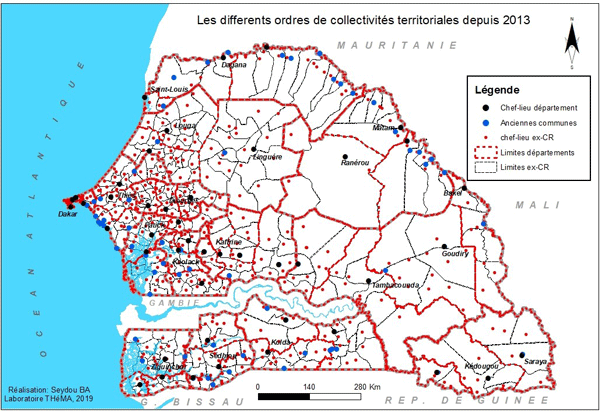Seydou Ba is defending his PhD thesis : The issue of viability and socio-economic development in institutional territories facing administrative divisions in Senegal
The defense will take place in Besançon at the Salon Preclin, UFR SLHS on decembre 16th at 10am.
This work was directed by Alexandre Moine, Professor at the University of Franche-Comté, laboratory ThéMA.
Defense jury
Frédéric Giraut, Professor at the University of Geneva, Switzerland
Jean-Christophe Gay, Professor at the University of Sophia-Antipolis, Nice, France
Stéphanie Lima, Lecturer at the INU Champollion, Albi, France
Abdourahmane Sene, Lecturer at the University of Assane Seck de Ziguinchor and Director of spatial planning of the Ministery of « Gouvernance territoriale, du Développement et de l’Aménagement du Territoire », Senegal
Christian Guinchard, Lecturer – HDR at the University of Franche-Comté, France
Abstract
The purpose of this thesis is to analyze the process of construction and delimitation of communal territories in Senegal. Indeed, in Senegal, the communes constitute the basic territorial collectivities. They have legal personality and financial autonomy. They are created by decree, which must be concretely translated into a territorial division.
During the first years of 2000, the steady pace of administrative divisions led to a rapid change in the territorial organization and in parallel to the number of territorialized actors. This dynamic of recomposition then provoked a lively debate on the underpinnings of the divisions and the relevance of the territorial entities. This situation is all the more worrying as a number of conflicts between local and regional authorities have become widespread.
However, the creation of new territories in Senegal is very rarely accompanied by a materialization of their spatial limits. This phenomenon creates a great deal of uncertainty around the boundary and causes various conflicts that hinder the management and development of communities whose physical territory remains more or less poorly known.
It is in this context that we are interested in the process of administrative divisions to understand how territorial boundaries are defined and set up? What roles do they play in the management, ownership, cohesion and development of the territories they contribute to create and of which they constitute a determining component? What is the real existence of these territories? What do they represent for the actors? It is to these concerns that this thesis has tried to answer, through the example of 5 communes in the Saint-Louis region.
This research was conducted on the basis of a systemic approach, the conduct of semi-structured interviews and the use of mind maps. The goal is to analyze and understand the complex process of building boundaries and territories.
For data processing and analysis, we used a method of empirical analysis of content in order to understand the different spatial reference scales of the actors; the process of creating municipalities; the actors involved and their roles; finally, their level of appropriation of the communal territories.

